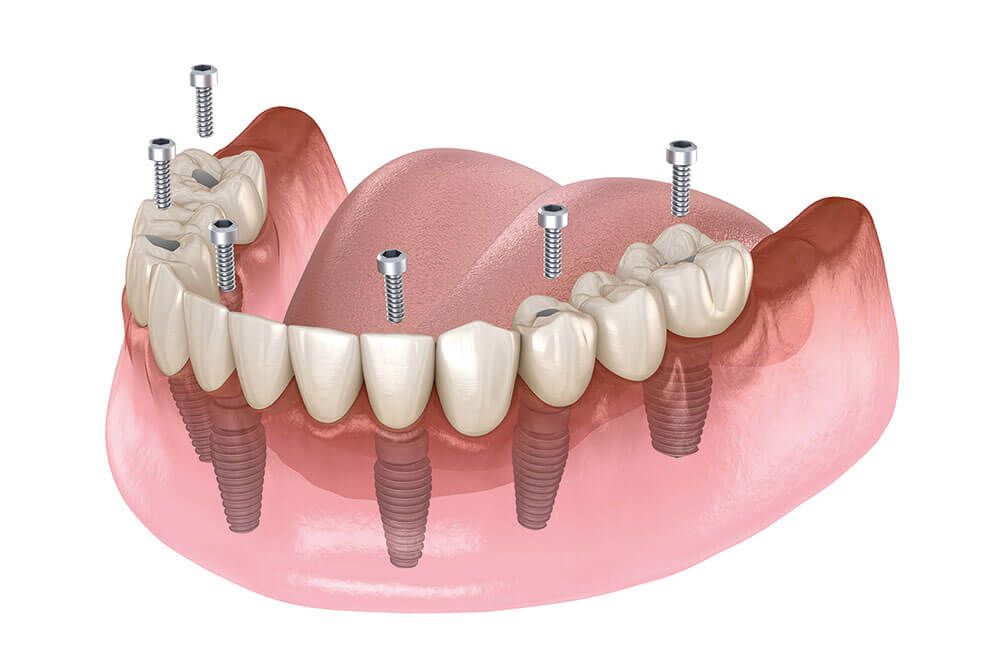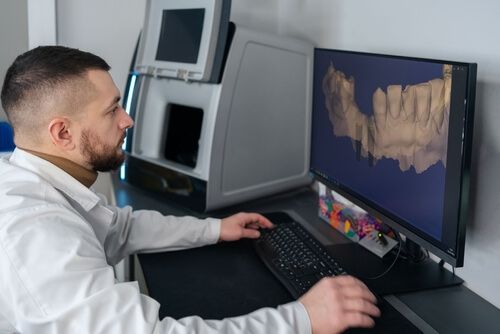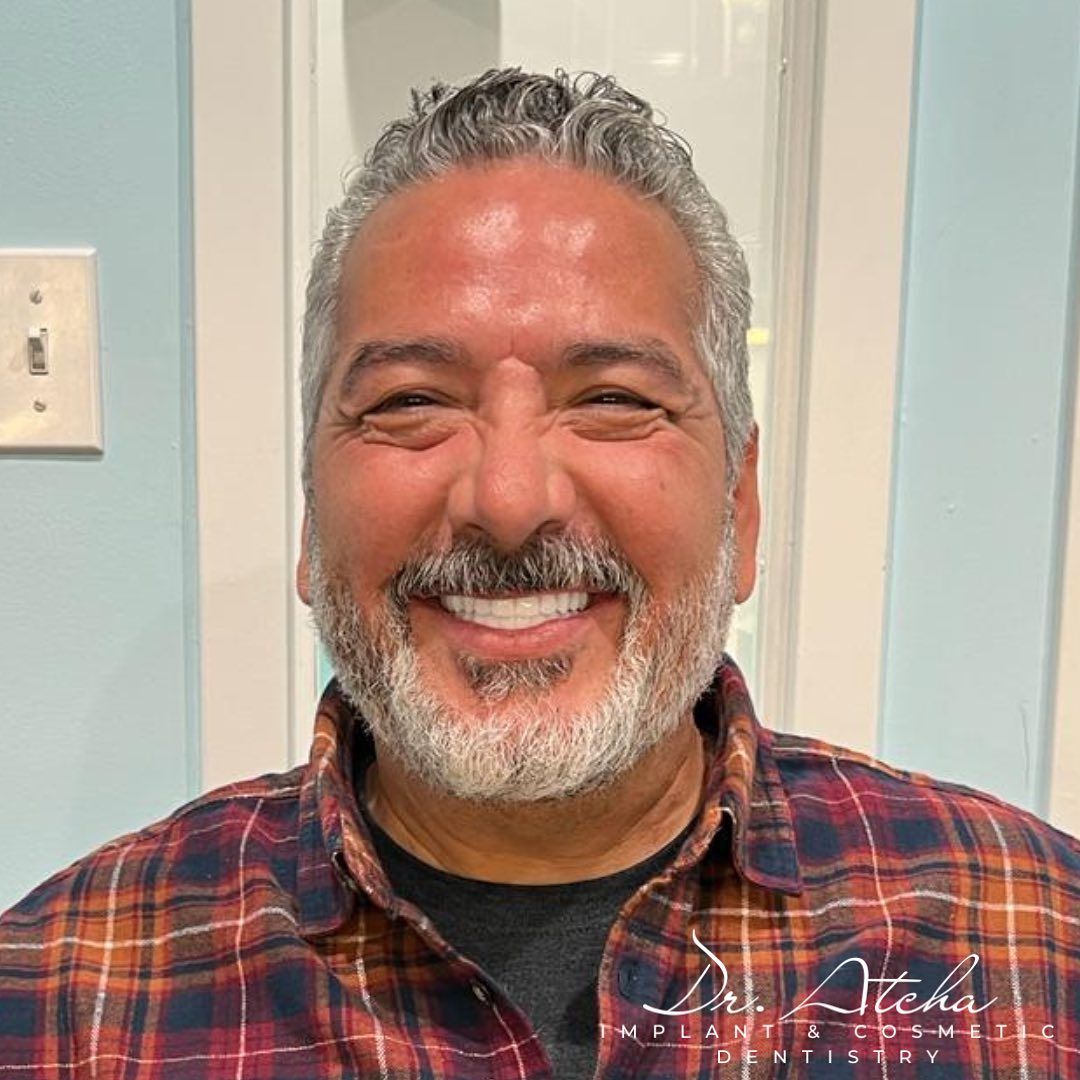A technique used to support a fixed denture for either the upper or lower jaw using only four implants. The implants are placed in the anterior region of the jaw, where bone density is higher. The back implants are typically angled to achieve maximum support from the existing bone.
The All-On-4 method can be particularly useful for patients who have lost a lot of bone and are looking for a full arch restoration without the use of a bone grafting procedure.
All-on-four dental implants have become an increased demand among patients. Through our expertise, you can learn more about this form of treatment, what factors are expected for patients after treatment, and how all-on-four implants can help replace missing teeth and restore gum and jawbone health.
Dr. Atcha is an expert at this state-of-the-art procedure and has performed more than 10,000 All-on-4 dental implant procedures.

The All-on-4 dental implants replace all your missing teeth on the upper or lower jaw using only four implants, which are inserted using a virtually painless procedure.
In addition to placing implants in your jaw bone, he can make use of your zygomatic bone to anchor longer implants. These longer implants work well for people whose upper jaw is deficient in bone or who wear upper dentures that don’t fit well despite having them fixed multiple times.
The All-on-4 implants procedure requires no bone grafting for most patients, while traditional implants often require bone grafting, a process that can take six months or longer. Traditional implants also require five to eight implants for one arch of teeth while the All-on-4 procedure only uses four implants for your upper or lower arch of teeth.
Dr. Atcha places the implants of the All-on-4 procedure at an angle, allowing them to have an increase in support by using the natural support of your jaw bone.
The procedure is relatively fast, taking approximately two to three hours per arch. Thankfully, published studies show a 98% success rate using All-on-4 dental implants.
Some side effects of the procedure may include pain, swelling, and soreness at the treatment site. Nonetheless, all of these symptoms should subside within a few days.
Dr. Atcha recommends you rest so you can adjust to your new implants for one to two days following the procedure. In addition, you should take care of your new implants the same way you would regular teeth by flossing, brushing, and visiting Dr. Atcha a minimum of twice a year for dental check-ups.
Enjoy a private, one-on-one consultation with Dr. Atcha to discuss the services offered at our office.
Dr. Atcha and the team at New Teeth Chicago Dental Implants have been awarded America's Best Dentists for over 5 years in a row.
We understand the importance of delivering long-term solutions.
Our process has been simplified to streamline your care at every step.
Patients from all over the world have rated Dr. Atcha as their #1 dentist.

For over 15 years, Dr. Atcha has been featured on stations across the US. Watch Now!
The longevity of All-on-Four implants can vary based on several factors, including individual oral health, oral hygiene practices, and lifestyle choices. When properly cared for and maintained, All-on-Four implants have the potential to last for many years, even decades. However, it’s important to note that the lifespan of the prosthetic teeth themselves may be shorter than the implants. The prosthetic teeth may require periodic replacement due to normal wear and tear or changes in oral health.
Maintaining good oral hygiene practices, including regular brushing, flossing, and professional dental cleanings, is crucial for the long-term success of All-on-Four implants. Proper oral care helps prevent gum disease and implant-related complications that could impact the implants’ lifespan.
The stability and longevity of dental implants are dependent on the health and quality of the surrounding jawbone. Adequate bone support is essential for the long-term success of All-on-Four implants. Maintaining good overall oral health and addressing any issues promptly can help preserve the supporting bone structure.
Certain habits and lifestyle choices can affect the longevity of dental implants. For example, smoking has been shown to increase the risk of implant failure. Additionally, habits such as teeth grinding or clenching (bruxism) can exert excessive force on the implants and prosthetic teeth, potentially leading to complications over time.
Routine follow-up visits with your dentist or prosthodontist are essential to monitor the health of your implants and address any potential issues early on. Regular examinations and maintenance can help detect and resolve problems before they lead to implant failure.
If you’re ready to replace your missing teeth and gain a million-dollar smile, then call New Teeth Chicago Dental today, or book your appointment online.

All-in-4 implants are proven to stand the test of time. In fact, data shows they can last for 20 years or longer with the right care. It’s important to remember that individual experiences may vary, and some factors, such as underlying health conditions or anatomical variations, can influence the long-term success of All-on-Four implants.

As of 2023, this procedure costs around $19,000 per arch. Consulting with an experienced implant dentist or prosthodontist is crucial to assess your specific case, provide personalized guidance, and offer realistic expectations regarding the lifespan of All-on-Four implants based on your unique circumstances.

We have several financing choices to match your budget. Most of our third-party lenders approve 4 out of every 5 applications. Plus, we take most insurance plans.
Dr. Atcha has over 25 years of experience and has successfully surgically placed and restored well over 15,000 dental implant cases over the course of his 25 years of experience.
At New Teeth Chicago Dental, we provide hope to people of all ages and walks of life. We have over 40,000 fans following us across our social media pages and have seen patients traveling across the globe for our expertise. We look forward to helping you achieve a radiant smile through any of our life-changing procedures.



